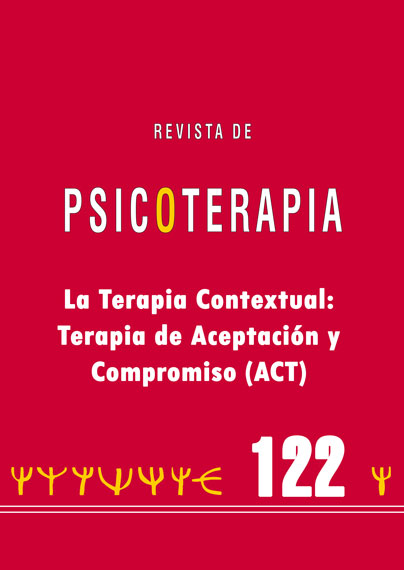Terapia de aceptación y compromiso centrada en el pensamiento negativo repetitivo para el duelo por ruptura complicada: Una evaluación aleatoria de líneas de base múltiples
DOI:
https://doi.org/10.33898/rdp.v33i122.1149Palabras clave:
terapia de aceptación y compromiso, pensamiento negativo repetitivo, relación de pareja, ruptura, dueloResumen
Las rupturas de relaciones románticas suelen provocar importantes consecuencias conductuales y emocionales que pueden llevar a experimentar un duelo complicado. Sin embargo, son pocas las investigaciones empíricas que han puesto a prueba intervenciones psicológicas para este problema tan frecuente. Este estudio preliminar exploró la eficacia de un protocolo de tres sesiones de Terapia de Aceptación y Compromiso (ACT) centrado en el pensamiento negativo repetitivo (PNR) para el tratamiento del duelo complicado por ruptura de pareja en tres mujeres. Se llevó a cabo un diseño de línea de base múltiple, aleatorio y no concurrente entre participantes. Las tres participantes mostraron disminuciones muy grandes en la angustia por la ruptura que superaron los criterios para afirmar la presencia de cambios clínicamente significativos. Dos participantes mostraron cambios clínicamente significativos en los síntomas emocionales, y todos ellos alcanzaron cambios significativos en la satisfacción vital. Las tres participantes mostraron cambios clínicamente significativos en pensamiento negativo repetitivo, evitación experiencial, fusión cognitiva y la vida valiosa. Los tamaños del efecto comparables entre diseños fueron muy grandes y estadísticamente significativos para la angustia de ruptura (d = 7.11), síntomas emocionales (d = 2.46) y satisfacción vital (d = 1.25). En conclusión, los protocolos de ACT centrados en PNR podrían ser eficaces en casos de duelo complicado por ruptura de pareja.
Descargas
Descargas
Publicado
Cómo citar
Número
Sección
Licencia
Los autores/as que publiquen en esta revista aceptan las siguientes condiciones:
- Los autores/as conservan los derechos de autor y ceden a la revista el derecho de la primera publicación, con el trabajo registrado con la Creative Commons CC-BY-NC 4.0 Internacional, que permite a terceros citar el texto y usarlo sin alterarlo y sin beneficio económico, siempre que mencionen la autoría del trabajo y la primera publicación en esta revista.
- Los autores/as pueden realizar otros acuerdos contractuales independientes y adicionales para la distribución no exclusiva de la versión del artículo publicado en esta revista (p. ej., incluirlo en un repositorio institucional o publicarlo en un libro), siempre que indiquen claramente que el trabajo se publicó por primera vez en esta revista.
- Las opiniones expresadas en los trabajos son responsabilidad única de los/as autores/as, no reflejando en ningún caso las opiniones o políticas científicas de la revista.














